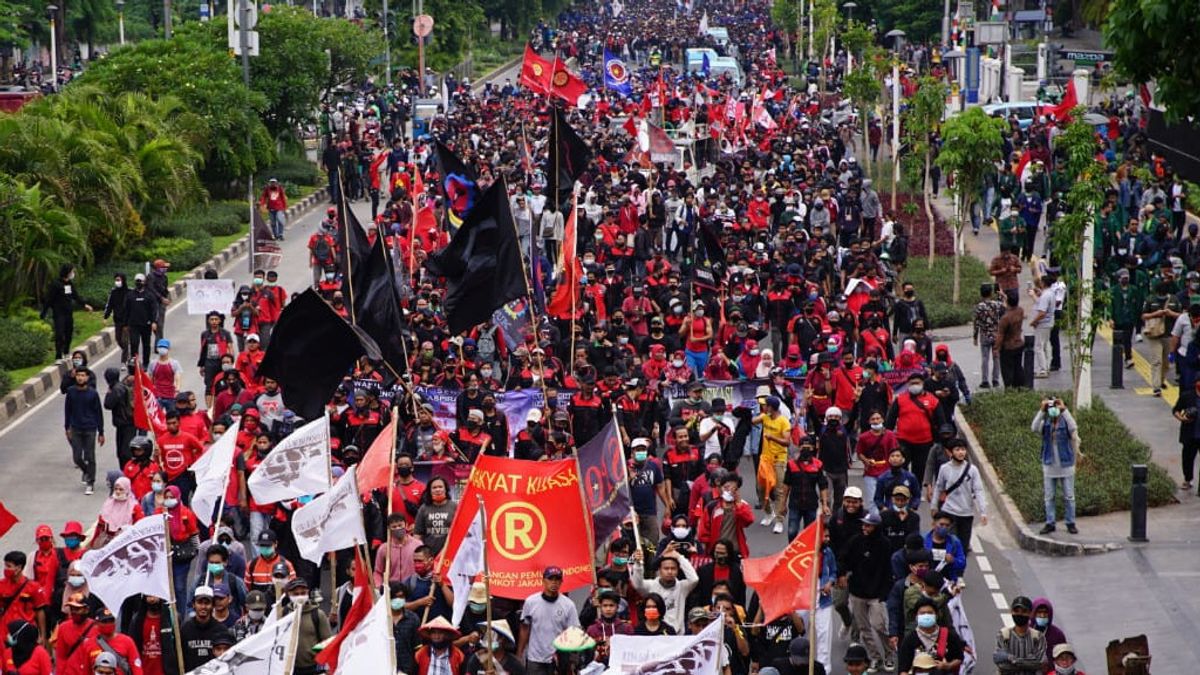JAKARTA - The President of the Confederation of Indonesian Workers Unions (KSPI) Said Iqbal said that his party would again hold a demonstration against the Omnibus Law on Cipta Kerja on Monday, November 2.
Iqbal said the action would be held in a number of areas. Meanwhile, the core action in Jakarta will involve tens of thousands of workers and be focused at the Constitutional Court (MK) and the State Palace.
"The national labor action on November 2 was carried out simultaneously in 24 provinces and 200 districts / cities and was attended by hundreds of thousands of workers. Meanwhile, the action at the Palace and the Constitutional Court was attended by tens of thousands of workers," said Iqbal in his statement, Monday, October 26.
Regarding the location of the action around the Constitutional Court building, Iqbal said that this was done simultaneously by submitting a judicial review of the Job Creation Law to the Court.
"During the submission of the judicial files, workers took a national action by demanding that the Constitutional Court cancel the omnibus law on the Job Creation Law and ask the President to issue a Perpu to cancel the Job Creation Law," said Iqbal.
KSPI decided not to participate in the action held by students on 28 October. This is because Iqbal predicts that President Joko Widodo will only sign and number the Job Creation Law on October 28.
Therefore, Iqbal chose the right time for the action and submitted a judicial review, namely on November 2, because the lawsuit was ready.
"KSPI estimates that the President will sign the Job Creation Law and the numbering is no later than October 28. Then, October 29 - 31 there will be a long holiday. So, the labor union will submit the judicial review file to the Constitutional Court on November 2, 2020," he explained.
For information, there are four crucial issues that are detrimental to workers in the Job Creation Law, ranging from issues regarding minimum wages, regarding employee contract status, job loss guarantees, and reduction of severance pay.
Abolition of minimum wagesThe government said that the UMP, UMK, and UMSP were not deleted. Said Iqbal confirmed that the minimum wage was not abolished. However, based on the copy of the draft held by KSPI, the Job Creation Law only regulates the matter of the provincial minimum wage (UMP) and the conditional regency / city minimum wage (UMK).
In the Job Creation Law, it is written that the governor is obliged to set the provincial minimum wage. The governor can also set the district / city minimum wage with certain conditions.
This is different from Law Number 3 of 2003 concerning Manpower which also regulates the District / City Sectoral Minimum Wage (UMSK). This "conditional" phrase is the basis for the resistance of the workers.
"If you say there is still a UMK, what kind of UMK? What the workers reject is the words 'conditional'. We don't know that. In other words, we ask to return it to the Manpower Law," said Said Iqbal.
Lifetime contract employeeSaid Iqbal refuted the narrative that an employee's potential can be made into a life-long contract is incorrect. The potential is still there.
In the Manpower Act, the work contract limit is set in several years. If the job is considered good, then the worker must be appointed as a permanent employee or an indefinite work agreement (PKWTT). Meanwhile, in the Job Creation Law, the time limit is not regulated.
"What is meant by fellow workers is that there is a potential for permanent employee disappearance because there is no deadline for the contract. As a result, there is no permanent employee appointment. The government should not explain it in half," he explained.
Job loss guaranteeThe government's argument is that job loss guarantees (JKP) can be obtained for a work period of 1 year. According to Said Iqbal, there is a possibility that this could be circumvented by the company.
"Because there is no time limit for the contract, the company can make a 6 month or 11 month contract, then break the contract, the important thing is not up to 1 year. That means the company does not need to pay JKP," he said.
Reduced severance payThe government says that the severance pay is not removed, only reduced. In the Manpower Law, the severance pay scheme is 32 months of wages, then in the Job Creation Law it is changed to 25 months of wages, with details of 19 months of wages being paid by the employer, and 6 months of being paid by the government BPJS Ketenagakerjaan.
Iqbal estimates that the BPJS will not be able to finance the 6 month severance pay scheme. Because, according to him, BPJS is currently experiencing a deficit. When there is a deficit, the government takes a solution to increase the BPJS contribution.
"When the BPJS contribution is increased, of course the workers will refuse. How come workers pay severance pay for themselves? So, return the severance pay scheme as in the Manpower Law, don't erase it," he added.
The English, Chinese, Japanese, Arabic, and French versions are automatically generated by the AI. So there may still be inaccuracies in translating, please always see Indonesian as our main language. (system supported by DigitalSiber.id)













